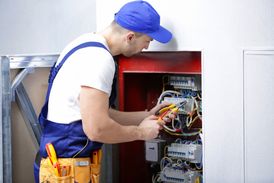What Every Homeowner Should Know About Their Electrical System

Your electrical system is one of the most critical components of your living space. It’s a fairly complex arrangement that often requires the expertise and technical knowledge of a licensed electrical contractor to address issues and maintain safety. Still, as a homeowner, you may find it helpful to understand the basics of how the system works to correct minor issues or mitigate major ones until professionals arrive.
A Homeowner’s Guide to Electrical Systems
What the Key Components Are
If your house depends on a utility company for electrical service, look for the meter and nearby disconnect switch for turning the power off in case of an emergency. This will usually be on your home’s exterior. Below are other vital components of your system.
- Service Panel: Also called the breaker box, this is the central distribution point for electrical service from the outside into your home through exit wires called branch circuits. It contains the main and circuit breakers. Its door should always be closed for safety. It’s usually installed in the basement or garage.
-
Main Breaker: The main breaker is the switch that controls power to the service panel. When it trips, there will be no electrical current flowing into the panel and its branch circuits.
-
Circuit Breaker: Typically smaller than the main breaker, these breakers manage the current flow to a particular branch circuit. Shutting the circuit breaker off means cutting power supply to a circuit’s connected devices and appliances. When a circuit is overloaded, the breaker automatically trips as a safety precaution.
-
Wiring: Numerous wires run throughout your home carrying electricity from the service panel to your devices. Wiring sizes are usually based on the required load demand of a particular appliance. Be sure to check its rated requirement to avoid overloading. This information can be found on the service panel.
-
Outlets & Switches: Electrical outlets are where you can plug devices to power them up. Switches turn them on and off.
How to Tell When Repairs Are Needed
 Even seemingly minor electrical problems should never be ignored. Address any issues at the onset to avoid hazardous situations like electrocution, electrical fires, and extensive property damage. Pay close attention to flickering lights, overly warm outlets and switches, and mild electrical shocks — there might be trouble with your wiring system. If you smell burning, hear popping sounds, or notice sparks when plugging in an appliance, it’s time to call an electrical contractor. Electrical contractors are trained and licensed to carry out the job safely and efficiently.
Even seemingly minor electrical problems should never be ignored. Address any issues at the onset to avoid hazardous situations like electrocution, electrical fires, and extensive property damage. Pay close attention to flickering lights, overly warm outlets and switches, and mild electrical shocks — there might be trouble with your wiring system. If you smell burning, hear popping sounds, or notice sparks when plugging in an appliance, it’s time to call an electrical contractor. Electrical contractors are trained and licensed to carry out the job safely and efficiently.
While knowing the basics of your system will prove useful, you shouldn’t attempt to solve complex electrical problems on your own. Instead, contact Zelek Electric for help. Serving residents and businesses throughout New London County, CT, for over 33 years, these electrical contractors have long provided outstanding services ranging from solar installations to system repairs. Schedule an appointment by calling (860) 434-9726 or sending a message via their website.
About the Business
Have a question? Ask the experts!
Send your question

